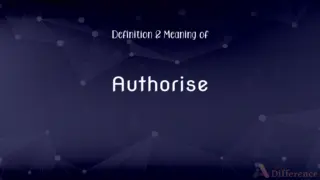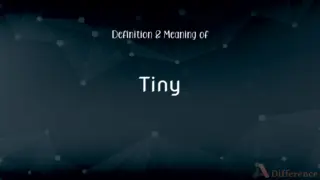Much Definition and Meaning
By Tayyaba Rehman & Fiza Rafique — Published on March 23, 2024
Much means a large amount or degree of something. e.g., She didn't get much sleep last night.
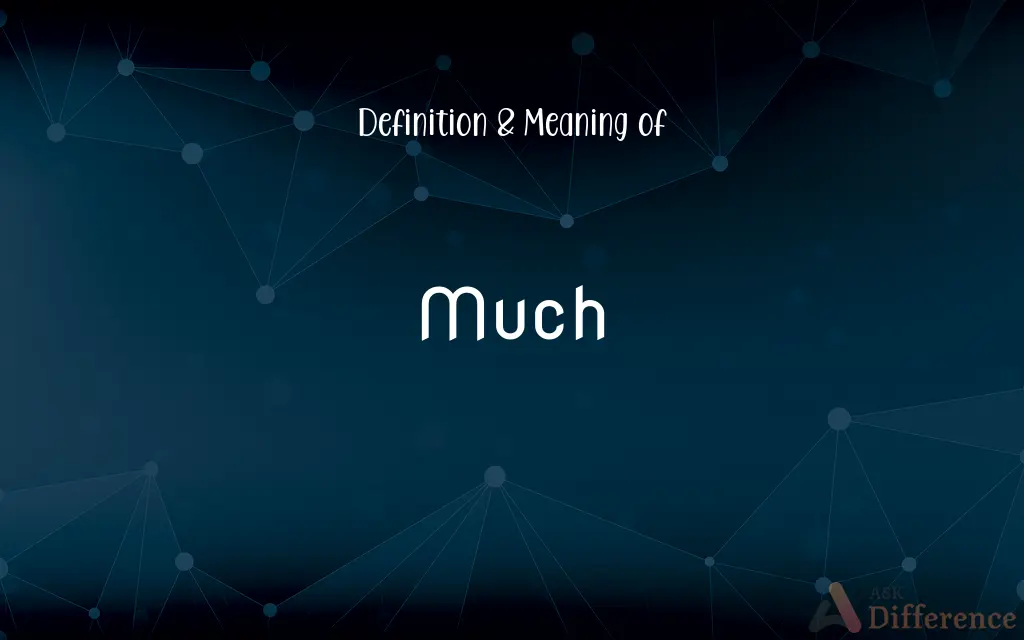
Table of Contents
Much Definitions
Used to indicate that something is the case to a significant extent.
We have much to discuss.
Used to express a lack or deficiency when used in negative constructions.
There isn't much time left.
A great quantity, amount, or degree.
He has much respect for his teacher.
Almost entirely; nearly.
The project is much complete.
Frequently or commonly.
This issue occurs much too often.
Used to form the comparative of many adjectives and adverbs.
She is much taller now.
To a great extent or degree.
The situation is much improved.
Used to emphasize a comparative.
This book is much better than the last.
Considerably; significantly.
The price is much higher than expected.
Many times; often.
He visits her much more now.
Great in quantity, degree, or extent
Not much rain.
Much affection.
A large quantity or amount
Much has been written.
Something great or remarkable
The campus wasn't much to look at.
To a great degree or extent
Much smarter.
Just about; almost
Much the same.
Frequently; often
Doesn't get out much.
A large amount of.
Hurry! We don't have much time!
They set about the task with much enthusiasm.
(in combinations such as 'as much', 'this much') Used to indicate, demonstrate or compare the quantity of something.
Add this much water and no more.
Take as much time as you like.
A great number of; many (people).
Many ( + plural countable noun).
(obsolete) Large, great.
(obsolete) Long in duration.
To a great extent.
I don't like fish much. I don’t much care for strawberries either.
He is much fatter than I remember him.
He left her, much to the satisfaction of her other suitor.
That boyfriend of yours is much {like - the same as} the others.
My English was much the worst, and I'm certainly not much good at math either.
Honestly, I can't stand much more of this.
Both candidates, who are much of an age, say much the same thing, but the youngest shows much the commoner behavior of the two.
Often; frequently.
Does he get drunk much?
(in combinations such as 'as much', 'this much') Used to indicate or compare extent.
I don't like Wagner as much as I like Mozart.
(obsolete) Almost.
A large amount or great extent.
From those to whom much has been given much is expected.
We lay awake for much of the night.
Great in quantity; long in duration; as, much rain has fallen; much time.
Thou shalt carry much seed out into the field, and shalt gather but little in.
Many in number.
Edom came out against him with much people.
High in rank or position.
A great quantity; a great deal; also, an indefinite quantity; as, you have as much as I.
He that gathered much had nothing over.
A thing uncommon, wonderful, or noticeable; something considerable.
And [he] thought not much to clothe his enemies.
To a great degree or extent; greatly; abundantly; far; nearly.
Thou art much mightier than we.
Excellent speech becometh not a fool, much less do lying lips a prince.
Henceforth I fly not death, nor would prolongLife much.
All left the world much as they found it.
A great amount or extent;
They did much for humanity
(quantifier used with mass nouns) great in quantity or degree or extent;
Not much rain
Much affection
Much grain is in storage
To a great degree or extent;
She's much better now
Very;
He was much annoyed
To a very great degree or extent;
We enjoyed ourselves very much
She was very much interested
This would help a great deal
(degree adverb used before a noun phrase) for all practical purposes but not completely;
Much the same thing happened every time
Frequently or in great quantities;
I don't drink much
I don't travel much
Much Snonyms
Numerous
Great in number; many.
He has made numerous attempts.
Plenty
A large or sufficient amount or quantity; more than enough.
There is plenty of time to finish the work.
Abundant
Existing or available in large quantities; plentiful.
The region has abundant wildlife.
Copious
Abundant in supply or quantity.
She took copious notes during the lecture.
A lot
A large number or amount.
She has a lot of friends.
Voluminous
Occupying or containing much space; large in volume.
She wore a voluminous dress.
Extensive
Large in amount or scale; ample.
They undertook extensive research.
Substantial
Of considerable importance, size, or worth.
They won a substantial amount of money.
Considerable
Notably large in size, amount, or extent.
The project required a considerable amount of time.
Significant
Sufficiently great or important to be worthy of attention.
The findings are significant.
Much Idioms & Phrases
As much as
To the degree or extent that.
He helps out as much as he can.
Make much of
To treat or regard as very important.
She made much of her new role.
Much ado about nothing
A lot of fuss over something of little importance.
The error was corrected quickly; it was much ado about nothing.
By so much
By that amount or degree.
The new model is lighter by so much.
So much for
Indicating the end or failure of something.
So much for my plans for a quiet evening.
Not so much
Used to express less degree or extent.
I like the design, but the color, not so much.
Much less
Used to emphasize the improbability of a situation or event.
He can't even boil water, much less cook a meal.
Much of a muchness
Very similar; having little difference.
The two proposals are much of a muchness.
Too much of a good thing
An excessive amount of something that is normally beneficial.
Eating dessert every night is too much of a good thing.
Thank you very much
A polite expression of gratitude.
Thank you very much for your help, she said.
Much Example Sentences
He didn't say much during the meeting.
Much of the forest has been preserved.
She spends much of her time reading.
There wasn't much interest in the proposal.
The situation has improved, but there is still much to do.
The technology has advanced much since then.
We have achieved so much in a short time.
The story was much the same as I remembered.
They have much in common.
She cared much for her community and worked tirelessly.
Common Curiosities
How many syllables are in much?
There is one syllable in "much."
What is a stressed syllable in much?
In the word "much," the single syllable "much" is stressed.
How do we divide much into syllables?
Since "much" has only one syllable, it is not divided further.
What is the pronunciation of much?
"Much" is pronounced as /mʌtʃ/.
What is the root word of much?
The root of "much" is the Old English word "mycel," which means "great" or "large."
How is much used in a sentence?
"Much" is used to describe a large amount or degree of something, e.g., She didn't expect much from the event.
Why is it called much?
The term "much" comes from the Middle English word "muchel" or "mochel," which originated from the Old English "mycel," meaning "great," "big," or "much." It is used to indicate a large amount or degree of something.
What is the verb form of much?
"Much" is not a verb; it is an adverb or adjective, so it does not have a verb form.
Is much a noun or adjective?
"Much" can function as an adjective (e.g., "much time") and also as an adverb (e.g., "much appreciated").
Is much a vowel or consonant?
The word "much" starts with a consonant.
Is the word much a Gerund?
No, "much" is not a gerund; it is an adverb or adjective.
Which determiner is used with much?
Determiners such as "so," "too," and "very" can be used with "much," e.g., "so much," "too much."
Is much a negative or positive word?
"Much" is neutral; its positive or negative connotation depends on the context in which it is used.
Is much a collective noun?
No, "much" is not a noun; it is an adverb or adjective and does not have a collective form.
Is the much term a metaphor?
"Much" itself is not a metaphor, but it can be used in metaphorical expressions to emphasize a large amount or degree.
Is the word much imperative?
No, "much" cannot be imperative as it is an adverb or adjective, not a verb.
What part of speech is much?
"Much" can be an adverb, as in "much appreciated," or an adjective, as in "much work."
What is another term for much?
Another term for "much" could be "a lot" or "plenty."
What is the singular form of much?
"Much" does not have a singular or plural form; its use does not change based on number.
What is the plural form of much?
"Much" remains the same in both singular and plural contexts as it is not a noun.
What is the opposite of much?
The opposite of "much" could be "little" or "a small amount."
Is much an adverb?
Yes, "much" can be used as an adverb to modify adjectives or other adverbs, e.g., "much better."
Is much an abstract noun?
No, "much" is not a noun; it is primarily used as an adverb or adjective.
Is much a countable noun?
"Much" is not a noun; it is an adverb or adjective, so it does not have a countable form.
Is the word “much” a Direct object or an Indirect object?
"Much" is neither a direct object nor an indirect object as it is not a noun; it is used as an adverb or adjective.
Which vowel is used before much?
The vowel or consonant used before "much" depends on the preceding word in a sentence, not a specific rule for "much."
Which preposition is used with much?
Prepositions like "of" are commonly used with "much," e.g., "much of the time."
Which conjunction is used with much?
Conjunctions like "and" or "but" can be used in sentences with "much," depending on the sentence structure.
Which article is used with much?
Articles are not typically used directly with "much" unless it precedes a noun phrase, e.g., "much of the work."
Share Your Discovery
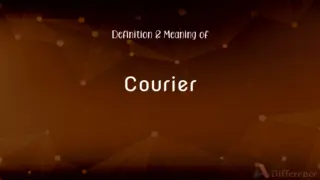
Previous Term
Courier Definition and Meaning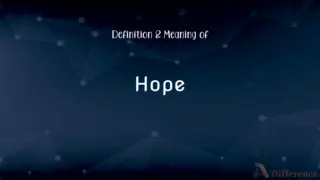
Next Term
Hope Definition and MeaningAuthor Spotlight
Written by
Tayyaba RehmanTayyaba Rehman is a distinguished writer, currently serving as a primary contributor to askdifference.com. As a researcher in semantics and etymology, Tayyaba's passion for the complexity of languages and their distinctions has found a perfect home on the platform. Tayyaba delves into the intricacies of language, distinguishing between commonly confused words and phrases, thereby providing clarity for readers worldwide.
Co-written by
Fiza RafiqueFiza Rafique is a skilled content writer at AskDifference.com, where she meticulously refines and enhances written pieces. Drawing from her vast editorial expertise, Fiza ensures clarity, accuracy, and precision in every article. Passionate about language, she continually seeks to elevate the quality of content for readers worldwide.







